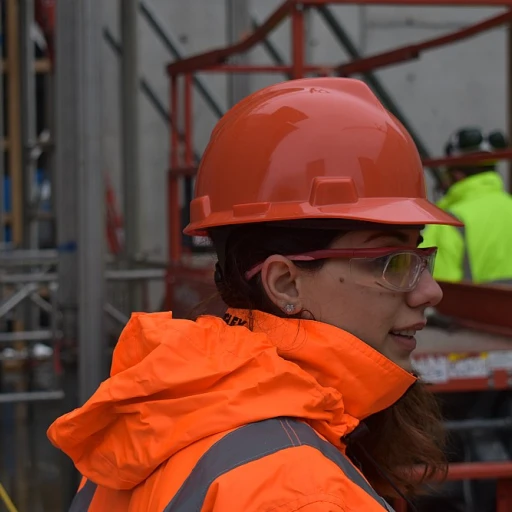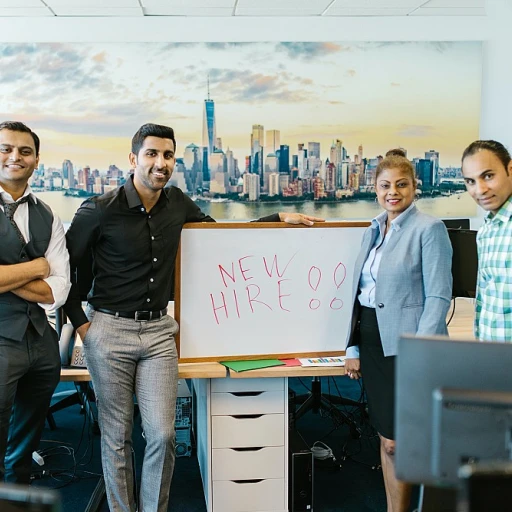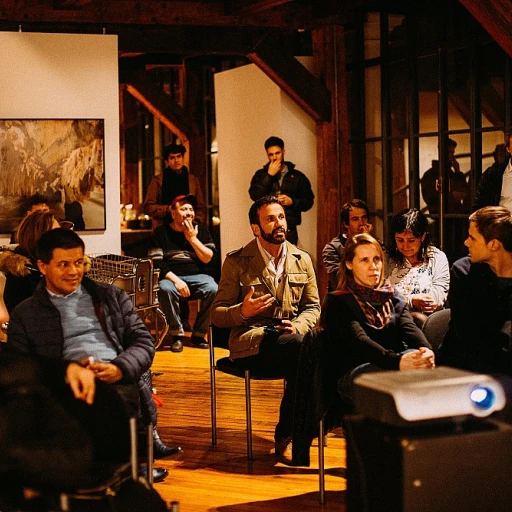
Defining Team Building in Corporate Culture
Understanding the Essence of Team Building in Corporate Culture
The concept of team building has become an essential component in fostering a strong corporate culture. At its core, team building refers to the array of activities aimed at enhancing relationships and collaboration within work teams. It plays a pivotal role in boosting employee engagement and overall productivity. In the dynamic landscape of today's corporate environment, where effective communication is key, team building activities serve as a medium to improve interpersonal relationships among team members. These activities range from simple fun activities like team games to more structured problem-solving exercises. By participating in these events, employees not only develop a better understanding of each other's strengths and weaknesses but also cultivate a sense of belonging within the company. Furthermore, team building days provide a break from the usual work routine, bringing a refreshing change that can rejuvenate the workforce. Most employees find these days filled with fun and enjoyment, which contributes to improved morale and job satisfaction. Effective team building is not just about having a day filled with physical activities or mental games; it's about creating an environment where every team member feels valued and connected. This underscores the importance of planning these events carefully, balancing fun with strategic objectives to ensure they meet the developmental needs of the group. For more insights on how to foster acceptance and enhance the effectiveness of your team building activities, you may explore engaging activities to foster workplace acceptance.Factors Influencing the Duration of Team Building Activities
Determining the Best Duration for Team Building Sessions
When it comes to organizing team building activities, the time spent plays a crucial role in shaping the overall success of an event. A key factor that influences the duration of these activities is the size of the team involved. Larger groups typically require more time to ensure that all team members have the opportunity to participate and engage in discussions effectively. This helps in fostering better communication within teams. Additionally, the complexity of the chosen team building activity is another important consideration. For example, activities that involve intricate problem solving or require extensive collaboration may naturally take more time to complete. Simplified building games or fun team events, on the other hand, can often be accomplished within a shorter timeframe, making them ideal for brief team bonding sessions or busy work days. Employee engagement also dictates the duration of team building activities. If employees are to truly bond and connect, the activities should allow ample time for interaction and sharing experiences, rather than feeling rushed. An effective team building session creates room for meaningful interactions, enhancing group cohesion and morale. Moreover, the goals of the team building day should factor into timing considerations. If the focus is on developing skills such as communication or collaboration, then longer, more structured activities might be advantageous. On the flip side, if the objective is simply relaxation and fun, shorter, informal gatherings might suffice. Ultimately, the optimal duration for team building depends on a combination of these elements. By carefully balancing time with effectiveness, companies can ensure that their team building activities are both enjoyable and successful in achieving their objectives. For some creative and engaging ideas for team building events, you might find inspiration in creative and humorous team award ideas, which can breathe new life into how group dynamics are approached within the company culture.Types of Team Building Activities and Their Typical Durations
Diverse Team Building Formats and Their Typical Lengths
Team building activities can vary greatly in their format, each serving distinct purposes and catering to different team dynamics. Understanding the duration of these activities is crucial in effectively planning and executing them within corporate culture. Here's a look at various typical team building formats and their respective time frames:- Icebreaker Sessions: Often incorporated at the start of meetings or work events, icebreakers are short and designed to kickstart communication. These activities usually last between 10-30 minutes, providing a quick yet effective way to energize team members.
- Workshops: More structured and in-depth, workshops can run anywhere from a couple of hours to a full day. They focus on specific skills such as problem-solving or effective communication, offering a more intensive team building experience.
- Team Retreats: These multi-day events offer teams the opportunity to disconnect from the usual work setting and engage in a variety of activities aimed at enhancing team dynamics. Retreats are often planned over a weekend or for 2-3 days, allowing ample time for both structured activities and informal bonding.
- Team Building Days: Typically lasting a full workday, these events are packed with group activities designed to foster collaboration and improve team bonding. The mixture of fun and strategic activities helps to strengthen team ties and stimulate creativity.
- Quick Team Building Exercises: For teams with limited time, short exercises ranging from 15 to 60 minutes can be highly effective. These activities aim to address specific aspects like communication and collaboration without taking up too much of the team's workday.
Balancing Time and Effectiveness in Team Building
Finding the Right Mix: Allocating Time to Team Activities
Balancing the duration of team building with the need for effectiveness is essential to ensure the event is both productive and engaging for employees. Too long, and it risks becoming monotonous; too short, and it might not achieve its objectives. Here are essential considerations for a well-balanced team building schedule:- Assessing Team Dynamics: Understanding the work team’s dynamics and the specific objectives of the team activity can help determine the appropriate length. For groups with established rapport, shorter activities might suffice, while newly formed teams might benefit from extended sessions to foster better communication and team bonding.
- Integrating Fun with Purpose: Successful team building days blend enjoyable activities with structured team development exercises. Balancing fun team games with problem-solving tasks encourages participation and keeps team members engaged throughout the process.
- Effective Time Management: Building events should allocate time wisely, ensuring ample opportunity for each activity. Team leaders should aim for a combination of shorter, interactive sessions along with a few longer, in-depth activities that challenge the group and promote employee engagement.
- Evaluate and Adjust: After a building day, it's important to assess its impact. Gathering feedback from team members can identify which activities were most effective and inform the planning of future team events. This review can highlight areas for improvement and help refine the duration of future sessions to enhance company culture effectively.
Case Studies: Successful Team Building Initiatives
Real-World Success Stories in Team Building
Understanding how different companies have successfully implemented team building activities can offer valuable insights into crafting effective sessions. Here are a few notable examples that highlight diverse approaches to team development:
Case Study 1: Tech Company Boosts Communication
A leading tech company faced challenges with inter-departmental communication. They organized a two-day team building retreat focused on problem solving and communication exercises. Activities included role-playing scenarios and group challenges designed to break down communication barriers. The result? Improved collaboration and a noticeable boost in employee engagement.
Case Study 2: Retail Giant Fosters Employee Engagement
In the retail sector, one company tackled low morale by hosting monthly team building events. These fun team activities ranged from building games to outdoor adventures. By dedicating regular time to team bonding, they saw a significant rise in employee satisfaction and retention rates.
Case Study 3: Financial Firm Encourages Team Bonding
A financial firm focused on strengthening their work team by organizing quarterly team building days. These events included team development workshops and competitive team games. The initiative not only enhanced teamwork but also helped align team members with the company culture, leading to a more cohesive work environment.
These examples demonstrate that when team building activities are thoughtfully planned and executed, they can effectively enhance team dynamics and contribute to a positive company culture. By balancing time and effectiveness, companies can create impactful team building experiences that resonate with employees.
Tips for Planning Effective Team Building Sessions
Guidelines for Planning Meaningful Team Bonding Sessions
- Identify Objectives: Establish clear goals for your team building activities. Whether you aim to enhance communication, improve problem-solving skills, or boost employee engagement, having specific objectives will help shape the event to cater to your team's needs.
- Choose Suitable Activities: Select activities that align with the skills and interactions you want to boost. For example, if the focus is on enhancing communication among team members, consider events that require group collaboration and discussion.
- Consider the Group Dynamics: Understand the personalities and preferences of team members. Some might enjoy outdoor adventures while others lean towards more relaxed, indoor activities. Considering these dynamics can lead to more effective team development.
- Allocate Practical Time: Decide on an appropriate duration for your activities. It's crucial to find a balance between productive team building days and draining long events that might lose their impact.
- Utilize Feedback: After each team building day, collect feedback from the participants. Understanding what was effective or what could be improved helps to tailor future activities to better suit the team's needs.
- Incorporate Fun Elements: Injecting fun team building games into your events encourages team members to participate more openly. Laughter and enjoyment can break down barriers and foster a positive company culture.
- Plan for Continuous Development: Team building shouldn't be a one-time event. Regular follow-up activities and events can maintain momentum and continuously develop the work team’s cohesion.
By meticulously planning, these team bonding sessions can effectively improve team communication and problem-solving capabilities while promoting a unified company culture. The balance of time and intention laid out in these guidelines will ensure your team building activities are both enjoyable and productive.













